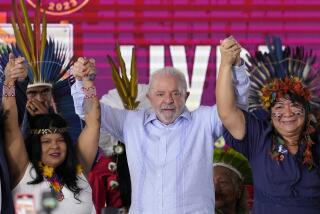Alfonsin Defies the Ghosts
- Share via
Argentina’s President Raul Alfonsin took a giant step over the weekend toward easing his countrymen’s fear of military coups when he faced down a rebellion by junior officers who objected to his human-rights policies.
Argentina has suffered through six such coups since 1930, the most recent and bloodiest in 1976. It looked as though yet another civilian government might fall when officers at two military bases last week said that they would fight rather than allow civilian authorities to judge military men suspected of human-rights violations. The rebellion began when a major, accused of having exceeded his authority during the so-called “dirty war” against subversion in the late 1970s, refused to face trial. Fleeing to the provincial city of Cordoba, a center of anti-government activity in the past, he was joined by sympathetic colleagues. A day later, officers at another base near Buenos Aires joined the brewing rebellion.
Alfonsin called on the rebels to surrender, and ordered loyal troops into positions from which they subdued the plotters. More important, Alfonsin rallied behind him the support of virtually every important sector of Argentine society and politics--even opposition parties that often attack him. On the fourth day of the crisis, hundreds of thousands of Argentines marched in the streets of Buenos Aires and other cities, cheering not just Alfonsin but civilian government and democracy as well.
Those street demonstrations, more than anything else, made it clear to the rebellious officers that this time the civilians would not be easily pushed aside. Alfonsin delivered the coup de grace on Easter Sunday when, at no small personal risk, he entered a rebel stronghold and persuaded the officers to give up.
It was a splendid display of patience and courage by a man who is the antithesis of the political strongmen who have often dominated politics in Argentina and elsewhere in Latin America. Alfonsin is no decorated hero, but a portly grandfather with an bland and unimposing presence. He also is a tenacious democrat, however, who insists that Argentina must exorcise the ghosts of an often-bloody past that includes not just the “dirty war” but also the dictatorships of Juan Peron and others in uniform if it is to live up to democratic ideals. Alfonsin showed on Sunday how inspiring even a bloodless stand for the rule of law can be. He set a magnificent precedent that may well be a turning point for democracy and civilian government in a country that has known too little of either for more than half a century.
More to Read
Sign up for Essential California
The most important California stories and recommendations in your inbox every morning.
You may occasionally receive promotional content from the Los Angeles Times.










